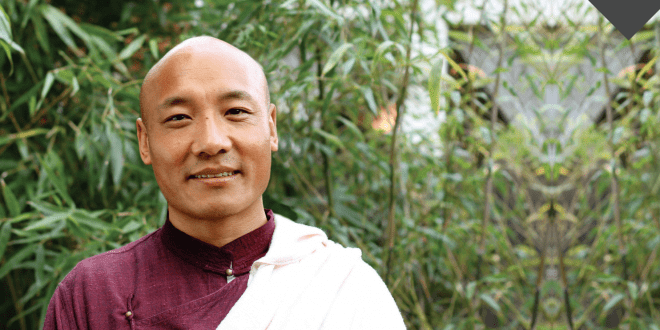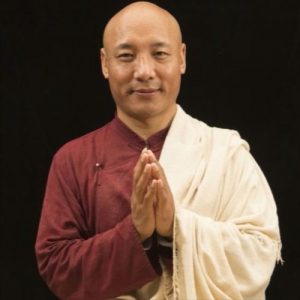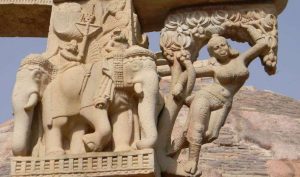
The Buddha said, “Contentment is the greatest wealth.”
His statement holds a timeless truth that rings true today more than ever. We are living in an age of unparalleled consumerism and materialism in which contentment is becoming an extremely rare commodity. Our society demands that we should yearn for more than we have and, as a result, many people feel that they have not yet reached the finish line in the game of “success.” This makes them feel profoundly inadequate and painfully envious at being unable to “keep up with the Joneses,” and invokes a hidden inferiority complex that can lead to harmful mental states and behaviors, such as self-hatred and addiction.
We Homo sapiens might never have been good at embracing contentment, however. Throughout history, we have demonstrated our innate greed by exploiting each other, conquering one other’s lands, stealing from each other. It seems that we do not have a natural instinct for being happy with what we have. Although we might have a comfortable life and our basic needs are being met, we still feel that we fall short of the social benchmarks of success, such as, “I don’t have as much as my brother, who is a multimillionaire,” or, “My neighbor just told me that she owns three houses,” or, “My former classmate is now a movie star.” This way of viewing the world convinces us that we have not achieved our dreams.
Conversely, contentment is the feeling that you are happy with who you are and what you have; the roles you play in the world—from janitor to president—and the material acquisitions that you own. In some ways, external things can indeed make us happy and content—at least for a while. Yet, they can never completely quench our insatiable craving for more power and possessions. This is mainly because contentment is a state of mind. Most probably, the nettle-eating Tibetan yogi Milarepa was a much happier person than the mighty emperor Genghis Khan, who continued to acquire ever more land and women under the unchallenged power of Pax Mongolica. Yet Milarepa was happy not because of his worldly glory, but because of his inner wealth: contentment. Genghis Khan, on the other hand, whose lust for power resulted in the deaths of millions, might well have lived a life filled with fear and anxiety.
There is a seemingly logical argument which encourages the belief that we should not feel contentment, otherwise we might be too happy and become lazy bums. Then our lives will succumb to inertia, preventing economic development and stagnating social progress. But this idea does not hold truth: greed is not a required element for personal success or economic advancement for any nation or culture. Societies can also become prosperous and modern based on the enlightened principles of love, compassion, and generosity. Looking around, there are many people who are exceedingly successful yet at the same time not greedy. Success comes through the application of intelligence and effort more than anything else. Inner contentment does not make us dull or sluggish; we need to adopt a new psychology that provides us with an alternative paradigm for living to the conventional materialistic viewpoint.
Being fulfilled is one’s experience of how things are in one’s life. Power and money have no true influence on this, and the satisfaction brought by such things is usually ephemeral, dissipating quickly. The truth is that one can be fulfilled with little, or whatever amount of wealth one has already accumulated. This is not to say that we should all become like Milarepa, who lived in a cave and had only worn-out clothes. We all deserve to have our basic needs met: food, shelter, medicine, and education, to have dignity, to be able to enjoy life, and not constantly suffer from hunger, pain, and injustice. Relatively speaking, most people living in developed economies already have a fairly high standard of living. Indeed, the middle classes in many Western countries today live more luxuriously than kings and queens of the distant past!
The modern world has a hard time treating the malady of greed. This is what Buddhadasa was pointing out when he expressed his desire to unite all the true religious people from every tradition to help his vision to, as he put it, “drag humanity out from under the power of materialism.” Modern society values material wealth so much that we forget the real needs of our brothers and sisters. Many people with unbelievable levels of wealth somehow want to accumulate still more money, and do not know when it is time to be content and show generosity toward their fellow human beings. This problem can be summarized in a nutshell in the old aphorism: “The poor stay poor and the rich get richer.” Our greed is destroying the well-being of our society, causing extreme levels of inequality that sooner or later create widespread poverty, violence, and the collapse of the rule of law.
Contentment might be the only solution for the many problems we are facing. As long as people lack inner contentment, we are going to have this hungry ghost occupying our hearts and are constantly going to strive for more of this and that. The whole world, it seems, wants to live the American dream. This is not good news. The Unites States is a great country that has shared its scientific knowledge and technological innovations with the world, as well as being a model for a free society. There are many good things to say about the US, but its influence on the world is not always perfect; it has not done a good job of embodying contentment. Imagine if everyone in the world starts living like Americans—can our fragile planet support billions of people indulging in excessive consumerism? There are only so many resources we can use before they start drying up altogether.
So what can we do? We can begin by learning how to be more content. The practice of gratitude is a wonderful and simple way to do this. Each day, we can practice a little gratitude here and there. In the morning, we can be thankful for the fact that we are breathing and alive. Each time we sit down to eat, we can be thankful for having food on the table and that we are not going hungry. While in the company of friends, let yourself feel how lucky you are to have those people in your life as a source of love and caring. Each night when you go to bed, feel fortunate that you have a roof over you, and wish that everyone in the world could also have the good fortune to have a place to call home.
The human brain is designed to rewire when we intentionally decide to change it. Extraordinary changes can take place in our brain when we use spiritual practices such as prayer and meditation to change our outlook. As we practice gratitude everyday, we are training our brain to feel less inadequacy and more fulfillment. This reduces the mental suffering that springs from anxiety, fear, boredom, and self-hatred that so many endure every day. Most of the time, our reality is personal and subjective—we can feel poor and inadequate while surrounded by material abundance, or we can feel rich and grateful simply because we are fortunate enough to have filled our basic needs.
Related features from Buddhistdoor Global
Venerable Hāsapañña: Finding Contentment in Solitude
“Mind the Gap Between Appearance and Reality”—Barry Kerzin Offers a More Nuanced View of Happiness
Driving at Night














